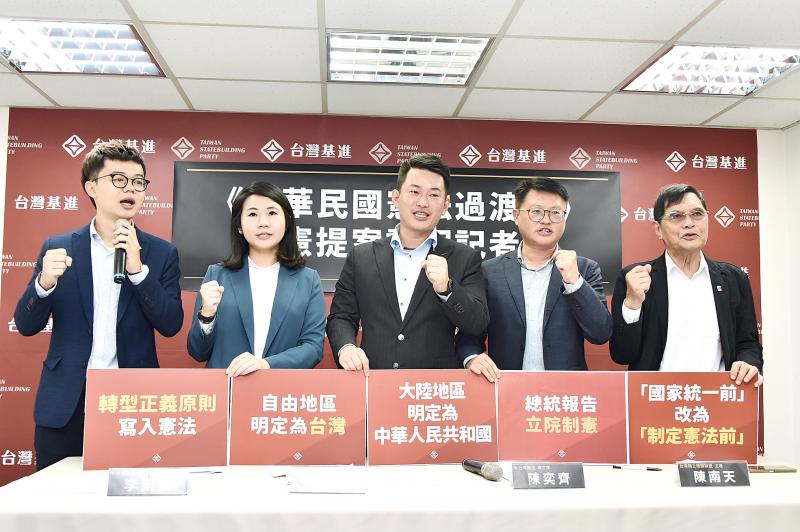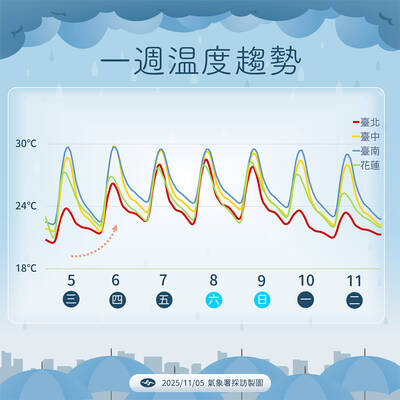The Taiwan Statebuilding Party yesterday proposed constitutional amendments to clearly distinguish Taiwan and China as separate countries, and remove the goal of unification from the Constitution.
Taiwan Statebuilding Party Legislator Chen Po-wei (陳柏惟) said that the Constitution does not reflect the current reality and perpetuates a political deceit, as it divides the Republic of China (ROC) into a “free area,” which is Taiwan and its outlying islands, and a “mainland area.”
“The ROC government does not control China, and this falsehood that it represents China is still being claimed by politicians, and remains part of the school curriculum, which is teaching lies to our kids,” he said.

Photo: Tu Chien-jung, Taipei Times
“I also support the ‘one China policy’ because there is a country called China, and another country called Taiwan,” he said. “This is why we need these amendments, to have a constitution for Taiwan, because like the majority of our citizens, I identify as Taiwanese, not Chinese.”
The party’s proposal focuses on five alterations to the Constitution, with the first to change the nation’s stated aim of “unifying the country” to creating a consensus among citizens for the “eventual establishment of a Taiwanese republic through a new constitution.”
Second, the “additional articles of the Constitution” should clearly define the “free area” as “Taiwan, Penghu, Kinmen, Matsu and the outlying islands under Taiwan’s governance.”
Third, the “mainland area” should explicitly be defined as the People’s Republic of China, they said.
Fourth, the president should be required to report to the legislature every three years, to assess and address any need for constitutional amendments, and the legislature would be mandated with initiating the amendment process.
Last, the new constitution must require the government to push for transitional justice, they said.
“Right now, more than 80 percent of our citizens identify themselves as Taiwanese. This is why our party wants to help create a new constitution, to closely conform to people’s core values,” Taiwan Statebuilding Party Chairman Chen Yi-chi (陳奕齊) said.
In many of the nation’s laws, the terms that define “free area” and “mainland area” are imprecise and open to interpretation, Chen said.
“But today with people identifying with Taiwan, and seeing China as a hostile country whose military aggression is threatening Taiwan’s existence, we must rewrite these definitions to clarify these terms,” he added.

Three Taiwanese airlines have prohibited passengers from packing Bluetooth earbuds and their charger cases in checked luggage. EVA Air and Uni Air said that Bluetooth earbuds and charger cases are categorized as portable electronic devices, which should be switched off if they are placed in checked luggage based on international aviation safety regulations. They must not be in standby or sleep mode. However, as charging would continue when earbuds are placed in the charger cases, which would contravene international aviation regulations, their cases must be carried as hand luggage, they said. Tigerair Taiwan said that earbud charger cases are equipped

Foreign travelers entering Taiwan on a short layover via Taiwan Taoyuan International Airport are receiving NT$600 gift vouchers from yesterday, the Tourism Administration said, adding that it hopes the incentive would boost tourism consumption at the airport. The program, which allows travelers holding non-Taiwan passports who enter the country during a layover of up to 24 hours to claim a voucher, aims to promote attractions at the airport, the agency said in a statement on Friday. To participate, travelers must sign up on the campaign Web site, the agency said. They can then present their passport and boarding pass for their connecting international

UNILATERAL MOVES: Officials have raised concerns that Beijing could try to exert economic control over Kinmen in a key development plan next year The Civil Aviation Administration (CAA) yesterday said that China has so far failed to provide any information about a new airport expected to open next year that is less than 10km from a Taiwanese airport, raising flight safety concerns. Xiamen Xiangan International Airport is only about 3km at its closest point from the islands in Kinmen County — the scene of on-off fighting during the Cold War — and construction work can be seen and heard clearly from the Taiwan side. In a written statement sent to Reuters, the CAA said that airports close to each other need detailed advanced

UNKNOWN TRAJECTORY: The storm could move in four possible directions, with the fourth option considered the most threatening to Taiwan, meteorologist Lin De-en said A soon-to-be-formed tropical storm east of the Philippines could begin affecting Taiwan on Wednesday next week, the Central Weather Administration (CWA) said yesterday. The storm, to be named Fung-wong (鳳凰), is forecast to approach Taiwan on Tuesday next week and could begin affecting the weather in Taiwan on Wednesday, CWA forecaster Huang En-hung (黃恩鴻) said, adding that its impact might be amplified by the combined effect with the northeast monsoon. As of 2pm yesterday, the system’s center was 2,800km southeast of Oluanbi (鵝鑾鼻). It was moving northwest at 18kph. Meteorologist Lin De-en (林得恩) on Facebook yesterday wrote that the would-be storm is surrounded by